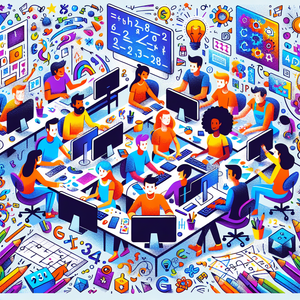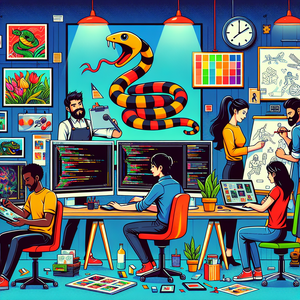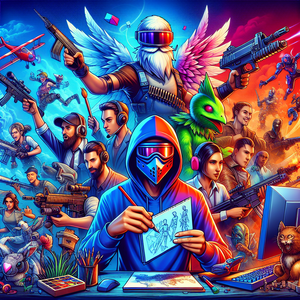
Exploring Careers in Educational Game Development: Insights from Cool Math Games and Beyond
The fusion of education and gaming is creating a wealth of career opportunities in educational game development. Platforms like Cool Math Games illustrate how interactive games can serve as effective tools for learning, particularly in mathematics. This article will take you on a journey through various roles in this dynamic field, showcasing how each position contributes to making math engaging and accessible. From game designers and curriculum developers to UX researchers and data analysts, the variety of roles highlights the blend of creativity, educational principles, and technology that drives this industry forward. We will explore key job titles, their responsibilities, required qualifications, and the impact they have on enhancing learning through games, particularly within platforms like Cool Math Games.
Job Summaries:
Educational Game Designer:
- Educational Game Designers are the visionaries behind the games that make learning fun.
- They create engaging mechanics that align with educational objectives.
- They craft captivating narratives.
- They ensure gameplay is suitable for various age groups.
- A blend of game design expertise and educational knowledge is essential for success in this role.
- Designers play a pivotal part in shaping how students interact with math concepts.
- They significantly contribute to the success of platforms like Cool Math Games.
Curriculum Developer for Educational Games:
- Curriculum Developers focus on integrating educational content with game mechanics.
- By collaborating with educators, they pinpoint learning goals and create lesson plans that enhance gameplay.
- Strong writing and communication skills are vital.
- A background in education or instructional design is important.
- This role ensures that games entertain while meeting educational standards, particularly in math-focused platforms.
User Experience (UX) Researcher:
- UX Researchers analyze how players interact with educational games to enhance usability and engagement.
- Through user testing and surveys, they gather insights that inform design improvements.
- Candidates need strong analytical skills and a passion for education.
- This role is crucial for ensuring that games are user-friendly and enjoyable, directly influencing player satisfaction on platforms like Cool Math Games.
Game Programmer:
- Game Programmers are responsible for coding the educational games that facilitate learning.
- They collaborate with designers and artists to implement gameplay features, ensuring functionality across platforms.
- A degree in computer science or a related field, along with proficiency in programming languages like C++ or Java, is typically required.
- This position is essential for transforming educational content into interactive experiences, particularly in mathematics.
Graphic Designer for Educational Games:
- Graphic Designers bring the visual elements of games to life.
- Creating characters, backgrounds, and user interfaces that resonate with players.
- They work closely with game designers to ensure visuals align with educational objectives.
- A robust portfolio and expertise in graphic design software are crucial.
- Their work enhances the visual appeal of educational games, making math learning more enjoyable for students.
Game Tester:
- Game Testers are the quality control experts of the game development process.
- They rigorously test educational games for bugs and functionality.
- They provide feedback on gameplay and user experience.
- Attention to detail and a love for gaming are important for this role.
- They ensure that educational games are both effective and entertaining.
Math Content Specialist:
- Math Content Specialists craft and review the educational material within math-focused games.
- They ensure the content is accurate and age-appropriate while aligning with educational standards.
- A solid background in mathematics education and strong communication skills are essential.
- By creating engaging math problems, they significantly enhance the educational value of games, especially on platforms like Cool Math Games.
Educational Technology Consultant:
- Educational Technology Consultants guide institutions on using gaming technology in their curricula.
- They evaluate the effectiveness of educational games and recommend best practices for classroom use.
- Strong communication skills and a deep understanding of both education and technology are critical.
- This role bridges traditional education with innovative gaming solutions, enriching the learning landscape.
Instructional Designer:
- Instructional Designers develop educational materials that integrate gaming as a learning tool.
- They analyze learner needs and create instructional strategies that effectively incorporate game elements.
- A background in instructional design or educational psychology is typically required, alongside familiarity with game-based learning principles.
- This role ensures that educational games engage students and promote effective learning outcomes.
Marketing Specialist for Educational Games:
- Marketing Specialists develop strategies to promote educational games to parents, educators, and schools.
- They create promotional content and analyze market trends to boost visibility and engagement.
- Strong communication and analytical skills are necessary, alongside a passion for education and gaming.
- This role is vital for raising awareness and encouraging the use of educational games, particularly those that support math skills.
Data Analyst for Educational Games:
- Data Analysts assess the performance of educational games through data collection and analysis.
- They evaluate engagement, learning outcomes, and overall effectiveness, providing insights that steer future development.
- A background in data science or statistics, along with expertise in data analysis tools, is typically required.
- This role is crucial for measuring the impact of educational games on student learning.
Audio Engineer for Educational Games:
- Audio Engineers create soundscapes and audio effects that enhance the gaming experience.
- They work on everything from sound effects to voiceovers, ensuring a rich auditory environment.
- A background in audio production and familiarity with relevant software are necessary.
- This position significantly contributes to the immersive quality of educational games, enriching the math learning journey.
Game Narrative Designer:
- Game Narrative Designers craft engaging stories and dialogues that captivate players.
- They create relatable characters and compelling plots that motivate players to progress in their learning.
- A background in creative writing or storytelling, combined with an understanding of educational objectives, is beneficial.
- This role ensures that educational games resonate with students and deepen their learning experiences.
Community Manager:
- Community Managers build supportive communities around educational games by engaging with players and educators.
- They manage social media channels, respond to queries, and organize events that foster engagement.
- Strong communication skills and a passion for education and gaming are essential.
- This role is vital for creating a positive environment that encourages collaboration and feedback.
Learning Experience Designer:
- Learning Experience Designers focus on creating effective learning experiences through educational games.
- They assess learner needs and design game-based activities that promote engagement and retention.
- A background in instructional design or educational psychology, along with experience in game development, is typically required.
- This role is key to ensuring educational games are engaging and effective in promoting learning.
Quality Assurance (QA) Lead:
- QA Leads oversee the testing process for educational games, ensuring they meet quality standards before launch.
- They develop testing protocols and manage the QA team to analyze results for improvement.
- Strong leadership skills and attention to detail are necessary.
- QA Leads are crucial for maintaining the high quality of educational games expected by users.
Educational Game Producer:
- Game Producers manage the entire production process of educational games.
- Overseeing budgets, timelines, and team collaboration.
- They ensure projects are completed on time and within scope.
- Strong project management skills and a background in game development are essential.
- This role is critical for bringing educational games from concept to completion.
Social Media Coordinator for Educational Games:
- Social Media Coordinators create and manage campaigns to promote educational games and engage users.
- They develop content strategies and analyze performance metrics to enhance online presence.
- Strong writing skills and familiarity with social media platforms are essential for attracting players and educators alike.
Game Localization Specialist:
- Localization Specialists adapt educational games for various languages and cultures.
- They ensure content is relevant and accessible to diverse audiences.
- They translate text, adjust cultural references, and modify gameplay elements as needed.
- A strong understanding of language and culture is crucial.
- Excellent communication skills are important for broadening the reach of educational games globally.
Behavioral Scientist in Game Development:
- Behavioral Scientists study player interactions with educational games to assess learning behaviors.
- They apply psychological insights to enhance game design and improve educational outcomes.
- A background in psychology or behavioral science, along with research experience, is typically required.
- This role is vital in understanding motivations and crafting games that effectively promote learning.
By examining these diverse roles, individuals interested in the educational gaming sector can find exciting opportunities that align with their passions for education and technology. With platforms like Cool Math Games gaining popularity, now is a perfect time to dive into this vibrant field, where innovative game development can transform how students engage with math learning. The potential to make a lasting impact on education through gaming is immense, making this an exciting time to be part of the educational game development landscape.
Explore More Jobs

